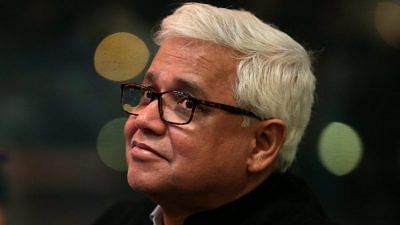New Delhi: On the day Chinese President Xi Jinping visited Nepal, author Amitav Ghosh took to Twitter to highlight some lesser-known facets about the history of the former hill kingdom and its relationship with China and India when the British ruled the subcontinent.
Ghosh, the Jnanpith Award winner, known for his stories focusing on borders, history and anthropology, reflected on how history-telling is still steeped in Eurocentrism, pointing out that at the dawn of the 20th century, when the British had a grip over most of South Asia, it was a miracle that Nepal escaped the fate, despite being 1/20th the size of India.
In a series of tweets early Sunday morning India time, Ghosh explained the trajectory of Nepal’s history and how the ‘lucrative’ opium trade with China deterred the East India Company from marching towards the hill kingdom in 1788.
The reason Nepal wasn't gobbled up by the British Empire was because the East India Company didn't want to jeopardize the lucrative trade between British India and China (opium, tea etc.). The Panchen Lama asked the EIC to attack Nepal in 1788, but it refused for this reason. 2/7
— Amitav Ghosh (@GhoshAmitav) October 12, 2019
Sharing the work of author Matthew Mosca, he noted that Nepal was invaded by China’s Qing dynasty in 1792/3 and became ‘tributaries’.
Instead the Qianlong Emperor's general, Fuk'anggan, invaded Nepal in 1792/3. Again Lord Cornwallis refused to help the Gurkhas. They were defeated and became tributaries of the Qing dynasty. They also became China's window on the Indian subcontinent. 3/7
— Amitav Ghosh (@GhoshAmitav) October 12, 2019
Before the 1st Opium War (1839-42), the Qing dynasty took the crucial decision to not support Nepal’s Gurkha rulers in launching an attack on the Bengal Presidency, which was under British control.
The Anglo-Gurkha wars of 1814-16 have been written abt endlessly; very little has been written about the Sino-Gurkha war of 1792. I've asked @Himalistan to publish s/th on this. They couldn't find anyone to do it. Stark evidence of how S. Asian history remains Euro-focused. 5/7
— Amitav Ghosh (@GhoshAmitav) October 12, 2019
“So China’s geopolitical presence is one of the main reasons why Nepal remained an independent nation, instead of being gobbled up by the British Empire,” Ghosh said. He also pointed to Eurocentrism in South Asian history as the Anglo-Gurkha wars of 1814-16 ‘have been written about endlessly’, in contrast to the Sino-Gurkha war of 1792.
Also read: Amitav Ghosh is the Jnanpith Award winner and climate crusader India doesn’t know it needs




The Gorkhas had successfully thwarted a military incursion by the EI Co. in 1767. Apart from the military prowess of the Gorkhas, a factor which the EI Co had in mind was the risk reward calculus . There was no particular strategic or economic gain to be had in annexing Nepal, that would have justified the effort & expense . Punjab, despite the risks, had to be annexed to enable the EI CO. to control access from the Hindukush Mountains, as an important part of the Great Game.
Are we to now conclude that like Tibet, China will someday in future demand that Nepal is part of its Middle Kingdom, as Nepali Gorkhas surrendered to the Qing Dynasty in 1792? And India should stop interfering in Nepal and watch Nepal becoming what Bhutan is to India? In this manner, as Pakistan is already made a colony by China, we have China from West to North to East of India. Sri lanka, Bangla Desh and Myanmar are already under the strong Chinese influence. And thanks to upcoming RECP, these countries will draw economically very close to China. Thus, very soon, India will be fully encircled by China from all sides!!
That’s what China’s intentions are. That’s what liberal thinkers, who are ready to go ga ga over China’s successes but become numb when someone discusses its excesses, would like.
It is possible that each sovereign country has some smart people working for it, especially in the Foreign Office. Advisors like Shri Gowher Rizvi, who astutely guide PM Sheikh Hasina how to keep the Elephant and the Dragon in good humour, while economic growth accelerates to 8%. Let us not be so dismissive of our smaller neighbours, think they are just waiting to roll over and submit to Chinese hegemony. They are doing their sums, watching how tectonic plates are moving beneath the Asian continent.
We were never colonised by the British is something Nepalis unfailingly point out to Indians when we get into a Monroe Doctrine frame of mind.